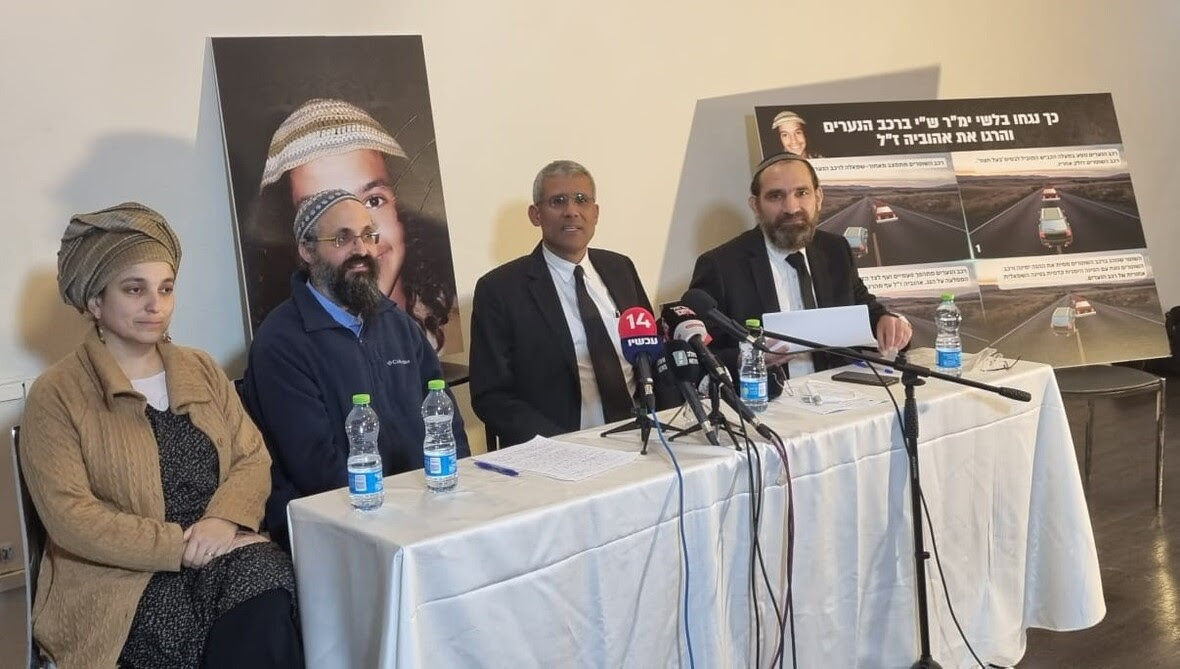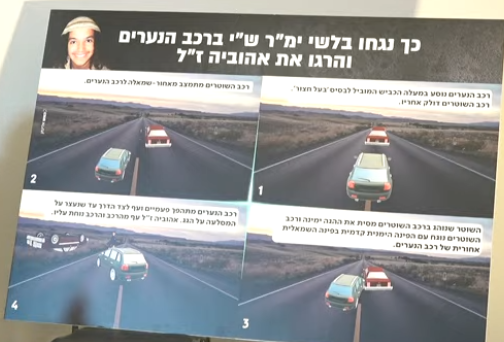Sunday, January 30, 2022, 14:15 Honenu is representing those who are insisting on the investigation of the death of Ahuvia Sandak, z”l, who was tragically killed in a police car chase, and defending the many who are being detained while demonstrating for change in police behavior. The car Ahuvia was in with four other boys overturned when the police car collided with it from behind. Please click here for a list of posts connected to the case.
The car ramming: On the day of the incident, December 21, 2020, there were eyewitness reports that the accident was a car ramming, and it is important to note that the police car was unmarked. Honenu Attorney Menashe Yado reported, in real time, from very close to the scene: “We have heard disturbing rumors of actions at the scene which border on disruption of the investigation. We cannot say anything for certain, but it should not be that the police are there, and according to rumors, the police car was moved before either the PIU or our traffic inspector arrived. This is a disturbing situation in which the police are suspected [of causing the death] and then inform me that I cannot enter the scene of the accident in which a police car is suspected of causing a fatal injury to a youth.” Please click here for more real time reports from the scene and from the hospital to which the four injured youths were evacuated.
The press conference: On Sunday, January 30, Avraham and Ayelet Sandak held a press conference with Honenu Attorneys Ariel Atari and Menashe Yado at which they responded to the decision by Attorney General Avichai Mandelblit to close the case against the policemen involved with Ahuvia Sandak’s death without an investigation.
At right is the depiction of the car ramming presented during the press conference. Note that the numbers run right to left. 1) The youths’ car is on the road leading to the Ba’al Hatzor Air Force Base. The [unmarked] police car is speeding after them. 2) The police car pulls out behind the youths’ car to the left. 3) The policeman driving the car turns the steering wheel sharply to the right. The police car rams its right front corner into the left back corner of the youths’ car. 4) The youths’ car overturns twice and lands on its roof on the side of the road. Ahuvia, z”l, is thrown from the car, which lands on him.
This is how the detectives from the Central Unit of the Yehuda and Shomron Police rammed the youths’ car and killed Ahuvia, z”l.
PIU whitewashing: Atari revealed an internal document from the PIU which describes the whitewashing of the investigation. The document was sent within the PIU in light of a complaint about the conduct of PIU head Keren Bar Menachem concerning the investigation into the death of Ahuvia, z”l. It describes how the policemen were summoned for interrogation at the PIU offices in the evening, several hours after the car chase, before their police action reports had been received. The head of the interrogation team prepared the interrogators as to how to interrogate the suspected policemen, because there was a genuine suspicion that the policemen would disrupt the investigation. Despite that, the head of the PIU released the policemen to their homes without them being interrogated at all, even though she was already aware of the suspicion that Ahuvia’s death was caused by the car ramming.
Additionally, according to the letter from the Attorney General and according to statements from the head of the interrogation team, the Attorney General was not aware of the above-mentioned interference by Attorney Bar Menachem, which could explain his erroneous conclusion to close the case against the policemen.
Ahuvia’s father spoke: Avraham Sandak made a statement at the press conference: “We have been stabbed in the heart again. Our son Ahuvia’s blood cries out from the ground, not only his blood. It is a cry for justice, a cry for our aspirations to build a just society in the Land of Israel. We, Ahuvia’s parents, are fighting not only for his sake, but for that of all children in Israel. We will do everything we can so that our son will be the last to die from police brutality and from baseless hate.
“Our demand is for an uncompromising striving for truth and justice. Our demand is for a fair trial. Why was the scene [of the incident] closed for so many hours? Why did the policemen submit their action reports so late? Where are the dash cameras? What happened with the Police Investigation Unit? We have been informed of leaks from the PIU and the Attorney General’s office about the shock from the degree of the cover up.
“After 2,000 years of exile we returned to our Holy Land in order to establish a civilized and honorable state, a light unto the nations, a state with the strength of justice in its judicial system. We expected the Attorney General to rely not only on the joint investigation of the police and the PIU, who are themselves suspects. We expected him to leave no stone unturned in the search for evidence that had been concealed from him and from us rather than making a decision based only on the information brought to him by the police.
“Why have we not been granted the elementary right to have our case heard in court? How has the Attorney General conducted a trial by himself without hearing the claims from the two sides? He has not heard our claims at all. We will continue to fight for justice for Ahuvia, for the sake of justice for all of Israel. We will not be silent and we will not be quiet until we have redress for our son’s death, because a despicable act has been done in Israel. We will continue to adhere to the word of our G-d, ‘Keep far from falsities and do not kill the innocent and the righteous’ (Ex. 23:7),” concluded Sandak.
The internal PIU document: Honenu Attorney Ariel Atari, who is representing the family, revealed an internal document from the PIU, according to which the PIU knew that the police car had rammed the youths’ car from behind. The document, which was revealed during the investigative news program ‘7 Days’ by journalist, Elisha Ben Kimon, describes the conduct of the PIU head during the investigation.
Atari: “On the day of the incident, it was very important to immediately conduct the interrogations. Initially, it was claimed that the interrogations were not carried out because it was not obvious that there had been a car ramming. This was refuted. The PIU knew that the police car had rammed the youths’ car.
“Later, the PIU interrogators who were appointed to interrogate the policemen understood that they were doing all that they could to avoid coming in and giving testimony. The policemen were evading their obligation to write what had happened and were not transferring the minutes from the incident, so the interrogators summoned them to interrogation. It was clear to the interrogators at the PIU that there was an attempt to disrupt the investigation. The policemen were summoned and the interrogators prepared to interrogate them in connection with causing the death of Ahuvia. Despite the late hour of the night, after the policemen were already at the station, and the interrogators were ready to interrogate them, the head of the PIU interfered and gave an unusual order: release the suspected policemen.”
Atari leveled sharp criticism at the head of the PIU: “There was a death and a car ramming, but they [the policemen] were released. They went home and had three days during which they could coordinate testimonies. The policemen arrived at the interrogation rooms of the PIU three days after the incident. These facts were not known to the Attorney General. Whoever reads the letter he wrote at the end of the week and reads his conclusions will be certain that he was not aware of the interference by the head of the PIU with regard to the possibility of coordinating testimonies. Her recommendation to close the case was designed to protect herself as much as it was to protect the policemen.
“Additionally, Ahuvia was under the car for an hour, and the policemen who were 15 meters away did not do what anyone would have done. They did not go to him and try to save his life. If they had done that, Ahuvia would be with us. The Attorney General is not making the minimum inquiry to determine whether or not the policemen should stand trial with regard to saving Ahuvia’s life. The Attorney General is going home [his term is due to end soon] and leaving us with hard feelings,” concluded Atari.
Honenu Attorney Menashe Yado also spoke at the press conference: “A youth was killed in a police car chase, and it is as if nothing happened. Everything is fine. The Attorney General rejected the testimony asserting that there was a car ramming. According to him, the accident occurred when the police attempted to pass the youths’ car in a reasonable way.
There is no indictment because the policeman’s decision to pass was reasonable. “And I say – and everyone can understand – that the decision was not reasonable. The cars were traveling at a very high speed – the youths’ car flipped twice in the air after it was hit – on a narrow, twisty, very rough road, when the entire time the youths were veering from right to left and not allowing the policemen’s car to pass. Under these conditions the policeman pulled out to pass. Not a split second later, as he pulled out to pass, the police car collided with the Subaru [youths’ car] and Sandak died. Was that a reasonable decision? Can anyone accept that?
“This was very much not a reasonable decision. It killed Sandak. The Attorney General cannot say that it was reasonable and validate the death. The public will judge and the case will advance to the High Court of Justice,” concluded Yado.


